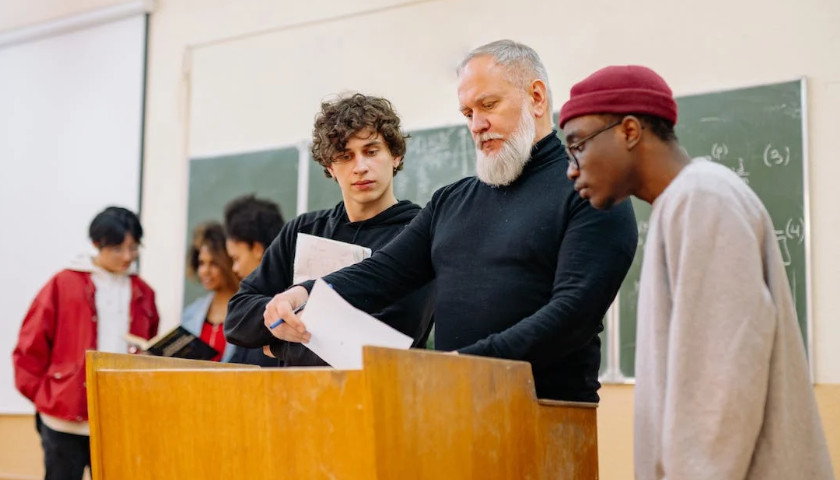by John A. Burtka IV
There is no subject of greater importance – and controversy – today in America than that of education. And nowhere is the clash between civilizational order and post-modern anarchy on greater display than with New College of Florida, a tiny liberal-arts college in Sarasota. The New York Times recently described the reaction of “students, parents, and faculty members” to Governor Ron DeSantis’s reforms of the college in a curious way: “a political assault on their academic freedom.”
As a tax-payer funded, public institution of higher learning, New College is – or at least ought to be – accountable to Florida’s citizens and elected officials. But, then again, the left is increasingly uncomfortable with representative government. It considers democratic institutions to be “messy.” Better to be ruled top down by “experts,” it claims.
At the same time, many conservatives rightly lament the role that universal public education has played in secularizing and liberalizing American society. But we cannot possibly hope to restore excellence to American education by exclusively relying upon private and voluntary associations, as they only impact a small minority of students.
Florida is leading the way. In the course of four years, the state has invested billions to raise teacher pay (with starting salaries over 15 percent of the national average), abolished sales tax on back-to-school shopping necessities, established a teacher’s bill of rights to hold public-sector unions accountable, and passed a parent’s bill of rights, which, among other things, forbids the teaching of sexual orientation and gender identity to students in kindergarten through third grade. Florida has further provided new educational pathways for high school students in vocational technology programs, dual-enrollment programs, and apprenticeships. It has also explored the prohibition of DEI programs at state universities and replaced leadership at colleges like the University of Florida and New College.
While each state will have its own unique set of needs and priorities, the transformation of Florida’s education system shows that it’s possible to raise standards, support students and parents, boost teacher compensation, fight radical ideologies, and win the broad support of the public. The ambition is not to create a single mode of education that applies to everyone – that would inevitably reduce educational standards to the lowest common denominator – but to use the power of politics and persuasion to apply top-flight learning to a variety of educational models, which respectively acknowledge the diversity of interests and capabilities of students.
For liberal-arts colleges, first and foremost, the classics must be put back in their rightful place in the core curriculum. Students have to be given the opportunity to step outside the confines of the 21st century. This type of education allows the world to be seen more fully, and, to be sure, more honestly.
For research universities, federal funding for student loans must be eliminated, administrative staff must be reduced, and DEI initiatives must be replaced entirely with a new system based solely on academic merit. Universities should also be held liable in bankruptcy court for former students who default on student loan debt, and standards of excellence should be set for measuring advances and innovations in science and technology.
At the high school level, the majority of graduates should no longer pursue a college degree. A college education is not the measure of all things. It’s unjust to force young Americans with a variety of backgrounds and interests into a one-size-fits-all program – rooted in post-WWII nostalgia – that burdens them with debt and poorly equips them for professional, familial, and civic life. Vocational training and apprenticeships should be encouraged and companies should be incentivized to hire and train high school graduates directly until a paradigm shift becomes manifest throughout workplace culture. Fixing higher education in America requires a whole-of-society approach.
At the Intercollegiate Studies Institute, we’re meeting this challenge head-on next week in the Free State of Florida where we are partnering with the Claremont Institute and the Heritage Foundation to host our first ever national faculty conference, the American Politics and Government Summit, which will convene professors and teachers from across the nation to explore the question of “Justice and the American Regime.” It will serve as an alternative to the American Political Science Association by providing scholars with a forum to civilly debate controversial topics and pursue truth. Moreover, they will be able to do this without fear of being canceled by the mob and needing to conform every thought and word to progressive dogmas.
Our effort as an educational and ideas organization is one small step towards reopening the American mind, and, I hope, returning sanity to an institution that has been held captive by narrow and self-destructive tendencies for far too long. But if we are to be successful at scale, we need to do more than host conferences and build associations. We need major, structural change in our public system of higher education. That will only come, at least in the next two years, from our elected officials at the state and local levels. The remarkable victories of both Governor DeSantis in Florida and Governor Glenn Youngkin in Virginia prove that addressing excellence in education is a winning formula.
Parents, of all political stripes, want the best education possible for their children. They want them to grow up to be upstanding citizens, good fathers and mothers, successful in their careers, and respectful and kind to their neighbors. They want them to love America, not blindly, but out of a sense of gratitude and a desire to make this country a better place for all.
– – –
John A. Burtka IV is president and chief executive officer of the Intercollegiate Studies Institute. Follow on Twitter: @johnnyburtka








